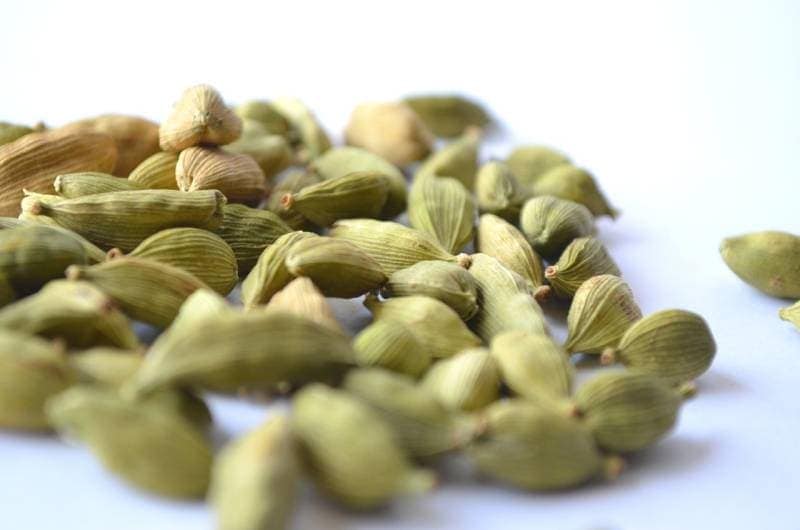If you’re a dog owner and a fan of flavorful spices, you might be wondering whether it’s safe to share your love for cardamom with your furry friend. Cardamom is a popular spice used in various cuisines worldwide, known for its distinct aroma and taste.
However, when it comes to feeding dogs, it’s important to consider their unique dietary needs. Is it actually safe for dogs to eat cardamom? Can they eat it? Well, yes! Cardamom is one of the spices that are non-toxic and safe for dogs. Though, like many foods, it is recommended to feed cardamom in moderation to avoid any unwanted digestive issues. It is also important to be aware that not all dogs can consume cardamom, such as pregnant dogs.
Still curious about cardamom? Here, we will explore whether dogs can eat cardamom and the potential benefits and risks involved when feeding this delicious spice to your dog!
What Is Cardamom?
Cardamom is a spice derived from the seeds of plants in the Elettaria and Amomum genera, which belong to the ginger family.
It is commonly used in both sweet and savory dishes, imparting a warm, aromatic flavor. Cardamom is available in two main varieties: green cardamom (Elettaria cardamomum) and black cardamom (Amomum subulatum).
Of the two varieties, green cardamom is more likely what you might find every day and what you might end up feeding your dog as it is more widely used and recognized!
Is Cardamom Healthy For Dogs?

When it comes to the health benefits of cardamom for dogs, research is limited. However, cardamom contains several compounds that may have potential health-promoting properties.
It is rich in antioxidants, which can help neutralize harmful free radicals in the body and boost the immune system. Cardamom is also known to aid in the movement of the stomach, easing discomfort from constipation, loose bowels, and indigestion.
Additionally, cardamom contains essential minerals like potassium, calcium, and magnesium, which are important for maintaining overall health.
Should You Feed Cardamom to Your Dog?
While cardamom does offer potential health benefits, it’s important to exercise caution when introducing any new food to your dog’s diet. Before feeding any new or unusual foods to your dog like cardamom, be sure to consult with your veterinarian prior to incorporating this spice into your dog’s diet.
As dog parents, we want our dog to be healthy and feed them the best and nutritious foods. But keep in mind that some dogs may be more sensitive to certain spices than others, and their digestive systems may react differently. This should also be kept in mind if your dog has any pre-existing health conditions or allergies.
Nutritional Content of Feeding Cardamom to Your Dog

Cardamom is a low-calorie spice which makes it a generally safe addition to your dog’s diet in moderation. It contains essential minerals such as potassium, calcium, and magnesium, which contribute to overall health.
Since dogs require a well-balanced diet that meets their specific nutritional needs, understand that cardamom alone cannot provide all the necessary nutrients. If incorporated into your dog’s diet, it should merely serve as a supplement to their normal diet on occasion!
Benefits of Feeding Cardamom to Your Dog
Although the research on the benefits of cardamom for your dog is limited, incorporating cardamom into your dog’s diet could still unlock potential benefits for your dog’s health. These benefits may include gut health, anti-inflammatory, and antimicrobial effects from cardamom.
Cardamom has traditionally been used as a natural remedy for digestive issues and it may help soothe an upset stomach, reduce gas, and improve digestion in dogs. Take note that cardamom also has a laxative effect if done in excess, so be sure to present cardamom in moderation.
There are also compounds in cardamom that have been shown to possess anti-inflammatory and anti-microbial properties. This can potentially benefit dogs with conditions like arthritis or other inflammatory disorders, as well as combat certain bacterial and fungal infections. These, paired with the vitamins, minerals, and antioxidants present in cardamom, can help boost your dog’s immune system as well.
Aside from the health benefits of cardamom, cardamom also has aromatic properties that can potentially freshen your dog’s breath!
How Should You Feed Cardamom to Your Dog?

If your veterinarian gives the green light for your dog to consume cardamom, it’s important to introduce it gradually and in small amounts.
Start by sprinkling a tiny pinch of ground cardamom over your dog’s regular food and monitor their reaction. Watch for any signs of digestive upset, allergic reactions, or unusual behavior. If your dog tolerates cardamom well, you can continue incorporating it into their diet sparingly.
Are There Risks of Feeding Your Dog Cardamom?
While cardamom is generally safe for dogs when given in moderation, there are a few risks to be aware of. For starters, dogs may have allergic reactions to cardamom and other spices. If you notice any signs of an allergic reaction, such as itching, swelling, vomiting, or difficulty breathing, it’s best to stop feeding cardamom immediately and consult your veterinarian.
While one of cardamom’s main benefits is digestive health, it may have a laxative effect if done excessively. Introducing a large amount of cardamom to your dog’s diet can sometimes cause gastrointestinal upset. Common signs include diarrhea, vomiting, and loss of appetite.
If you observe any of these signs, stop giving cardamom to your dog immediately and allow their digestive system to settle. If the issues persist or worsen, seek veterinary advice.
Why Is Cardamom Dangerous for Pregnant Dogs?

Although there is limited evidence regarding the effects of cardamom on pregnant dogs, professionals generally recommend avoiding cardamom as it may put your dog at risk of having a miscarriage. We could not find the source of this information but the FDA shows that the spice can harbor pathogenic bacteria and the spice is used to treat gynaecological complaints in alternative medicine.
Cardamom, like many other spices, is thought to contain compounds that can potentially stimulate the uterus. This property may pose a risk to pregnant dogs by potentially causing contractions and complications during pregnancy. Therefore, it is strongly advised to avoid feeding cardamom to pregnant dogs to ensure the safety and well-being of both the mother and her puppies.
Cardamom also passes in the milk and so should not be given to lactating females either.
What Should I Do If My Dog Ate a Lot of Cardamom?
If your dog accidentally consumes a significant amount of cardamom, it is essential to monitor their behavior and contact your veterinarian for guidance.
The excessive consumption of cardamom can lead to digestive disturbances and other adverse effects. If you observe any adverse signs of digestive upset, it’s best to consult your veterinarian immediately. Your veterinarian may recommend various treatments based on your dog’s signs and the amount of cardamom ingested.
What Other Spices Are Safe and Healthy for Dogs?
While cardamom can have potential benefits for dogs when used appropriately, there are several other spices that are safe and healthy to incorporate into your dog’s diet. Some examples include turmeric and ginger.
These spices typically have similar benefits such as facilitation of digestive health, anti-inflammatory and anti-microbial properties, and even the aromatic property to help with their breath. As with cardamom, however, it is important to consult with your veterinarian prior to feeding these spices to your dog and to only feed them in small amounts at a time!
Final Thoughts
In conclusion, while cardamom could offer potential health benefits for dogs, it is important to exercise caution and moderation when introducing this spice into their diet. Consulting with your veterinarian is important to determine whether cardamom is suitable for your dog, taking into account their specific health needs and any potential allergies.
By being mindful of your dog’s individual needs and consulting with professionals, you can make informed decisions about their diet and ensure their well-being!
See Also:
- How to Help When Your Dog Has a Seizure: 9 Vet-Approved Crucial Steps
- How to Stop Dog Seizures: Our Vet Discusses Causes & Treatments
Featured Image Credit: JaspreetKalsi, Pixabay
Contents
- What Is Cardamom?
- Is Cardamom Healthy For Dogs?
- Should You Feed Cardamom to Your Dog?
- How Should You Feed Cardamom to Your Dog?
- Are There Risks of Feeding Your Dog Cardamom?
- Why Is Cardamom Dangerous for Pregnant Dogs?
- What Should I Do If My Dog Ate a Lot of Cardamom?
- What Other Spices Are Safe and Healthy for Dogs?
- Final Thoughts










